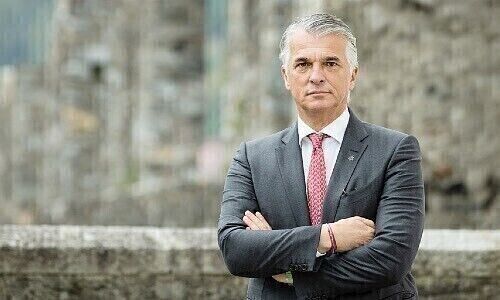Sergio Ermotti: «That Was Pretty Extraordinary»
Despite solid quarterly numbers at UBS, commentators and investors remain lukewarm. Looking ahead, the outlook is riddled with variables, and CEO Sergio Ermotti says he will concentrate on what the bank can influence itself.
Trade disputes, a potential trade war and, not least, the prospect of revamped capital-adequacy rules—all crowd a long list of uncertainties UBS must navigate.
That list does not yet include the ongoing challenges of absorbing Credit Suisse. The migration of CS clients is slated to finish by year-end.
Investors Reshuffle Portfolios
One specific strand of uncertainty—along with the higher volatility it brings—is actually fuelling the big bank’s business: client activity has risen sharply, something also reflected in fee income.
The waves of uncertainty stirred up by the Trump administration have pushed investors to rebalance portfolios, giving trading desks at global banks a noticeable lift.
UBS benefited from markedly higher client activity in the first quarter. The trend continued into the second quarter from early April, after US President Donald Trump intensified his tariff brinkmanship.
High Volatility
«We saw a massive, short-term spike in client activity and volatility in the first days of April,» Ermotti told reporters on a Wednesday conference call. Trading volumes were 30 percent higher than at the height of the pandemic – «pretty extraordinary,» he noted.
While conditions have since normalised, he expects volatility to stay elevated, with markets swinging sharply in both directions.
Uncertainty Carries a Price
Those same uncertainties threaten real problems for companies—and thus for their banks. Ermotti warned that mounting anxiety over trade policy could cause firms to delay investments and push deal-related fees lower.
«It will depend on developments on the tariff front,» he said. «Uncertainty has a price. Investors and corporations may scale back their investment plans.»
Fact-Based Decisions
As debate over capital rules looms, Ermotti struck a cautious tone: «It is crucial that every decision is rooted in facts, not myths or ideological considerations,» he said. The impact of any changes, he repeated, would reach far beyond UBS to the competitiveness of the Swiss financial centre itself.
The political outcome is uncertain, and «a prolonged period of ambiguity will also exact a cost.»
Overriding Priority
Ermotti says he will stay pragmatic, declining to guess where the process might end. His overriding priority is integrating Credit Suisse while ensuring UBS continues to serve its clients well. «We’ll concentrate on what we can control,» he added.




























